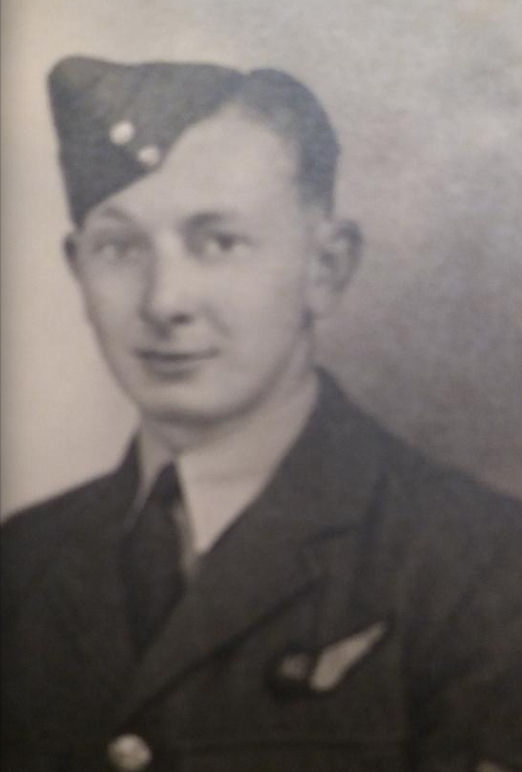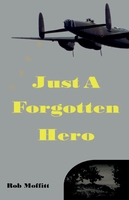This is to introduce my book ‘Just Another Forgotten Hero’. I have spent nearly a year as one of a small group of strangers researching the fascinating story of one ordinary man’s extraordinary life, from his humble beginnings in rural North Wales to his wartime adventures in the RAF and his eventual death as a homeless down and out.
He had been the rear gunner in a Lancaster bomber which was shot down on its way back to England after a raid on the Rhur industrial complexes. The other six members of his crew all died. He managed with the help of local patriots to return to Britain via France, Spain and Gibraltar, a risky journey that took him two months to complete. But life was not kind to our hero and he died alone and homeless estranged from his family, which is sadly not that unusual for ex-servicemen. Through painstaking research his family tree was built and his story was slowly uncovered. Did we then manage to find any of his survivng offspring who had known nothing of his later life to pass all this information on to?

Sorry, but you will need to buy the book to find that out!
You can now order directly from us here for delivery in UK and USA.
These books will be despatched directly from our distributors. The current price is £9.99 in the UK and $12.99 in the USA plus shipping. Or you can use the QR code.

Of course you can also buy/order from your favourite local bookshop or Amazon
Just A Forgotten Hero
Preamble
Introduction
The following is an entirely true tale, and tells the story of a search for living descendants of an ex-RAF Air Gunner who was shot down over Belgium during World War 2. The time-line of the search is accurate, and told from my point of view as one of those concerned in that quest.
Many aspects of the fascinating and involving story of this airman’s life and experiences were uncovered during the research and these are included in this tale. How could they not be? While many of these are unique and specific to this one man, many other forgotten heroes shared the same, or very similar, events. We must remember them all, for whether they came back whole, wounded or paid the ultimate price, certainly none remained unmarked. These tales are not recounted in the piecemeal haphazard way in which they were discovered, but more in relation to their own time line simply to make those parts of his story less disjointed and more readable.
The only minor departure from the truth, as I know it, is that the names of all persons still alive at the time of writing have not been given in full in order to respect the wish for privacy expressed by some of their number.
Chapter 1
A Sad and Lonely Place

In an unmarked grave in Everton Cemetery there lies buried a long forgotten tale of love and loss, daring and despair, triumph and tragedy. Only now, more than 35 years after he was laid to rest here, can I tell you this man’s fascinating story. So whose mortal remains were placed there on the third of January 1985, alone and unremarked with neither friend nor relative to mourn his passing? A war hero, a father, a husband, someone’s son. An incredibly lucky and yet a desperately unfortunate soul. A typically unique individual much like any of the rest of us.
How and why did I get to know his story? Well, that is a story in itself, and it began on an ordinary, boring sort of a day.
Chapter 2
An Appeal for Help

July 14th 2018 An article on the BBC News website caught my attention. Gregory Delbrouck was asking for help to trace anyone with a connection to an RAF veteran who was shot down over Belgium at the beginning of June 1942, he was the only survivor from the seven man crew of a Lancaster bomber. Whilst sorting through his late great aunt’s effects Gregory had discovered some articles and notes about her work for the Comet Escape Line during the war, a period which Joséphine Van Durme would never discuss.
In particular he had found a set of RAF Air Gunner’s wings, and a bloodied scrap of uniform shirt sleeve with the lump of shrapnel that had caused that wound. From Joséphine Van Durme’s detailed notes, which she had made at the time and a thank-you letter written in Welsh signed by W R Griffiths. He knew that these belonged to a William Roch Griffiths whom he had discovered had lived at some time in Barmouth North Wales and died in Fazackerly hospital long after the war, but Gregory had been unable to find any living relatives.
Now tracing people from the merest scraps of information is what keeps me doing genealogical research, the satisfaction of uncovering the who, why, when and where that nobody else knows. Besides which no hero should pass in such unremarked circumstances, though sadly far too many do. I was in complete agreement with Gregory; this chap should not be one of those.
With such a distinctive middle name I thought that this would be quite straight forward. (Bad Assumption number 1) A few hours rooting around in some dusty documents, and we would have his family tree all worked out. (Bad Assumption number 2) Then finding some living relatives would follow quite easily. I don’t want to labour the point, but this was Bad Assumption number 3, and it would by no means be the last! I sent off an e-mail to the BBC asking them to pass on my contact details to Gregory Delbrouck.
17th July Feeling very disappointed at having heard nothing after three days, I did an internet search for Gregory, and found a very similar article in the Cambrian Times printed on the 9th July. Being keen to get on with finding William Griffiths’ relatives, I e-mailed them too, and had a telephone call from their reporter within the hour. He passed my details on to Gregory who e-mailed me the same evening with a warm welcome and some useful information that he had already uncovered.
Now I had a copy of William’s death certificate, and from the National Archive in Kew, a couple of reports that he had made to MI9 after his return to the UK at the end of July 1942. The first one was a combat report describing the events that occurred during his last fateful mission, and the other recounted his evasion and eventual arrival in Gibraltar. He had also sent an account of his adventures behind enemy lines from the archives of the Comète Line.
This Belgian article was a recent work published on line by researchers of the Réseau Comète (English translation: Comet Network). This was an organised way of transferring allied military personnel back to the UK through occupied territory operated by Belgian civilians opposed to the German occupying forces. William’s journey would be through Belgium, France and then over the Pyrenees to ‘neutral’ Spain, a long and hazardous trip which would take him five weeks.
This would involve many brave escape line members who put their lives at risk in the hope of a better future for their homelands. Many of those would not live to see that happen. They were a vital part of our hero’s tale, and his life would have turned out completely differently but for their help. But we are running too far ahead of ourselves. We’ve got to discover how he came to be there first, before we can find out how the Comet Line had helped to get him back home, and what happened to him after that.
Time for me to get to work.
Other extracts will be published on the posts pages, and will be available to all my readers. I do expect you all to respect the copyright rules. Other, longer sections of the book will only be in password protected areas. If you have a good reason to view those you can request permission here.

